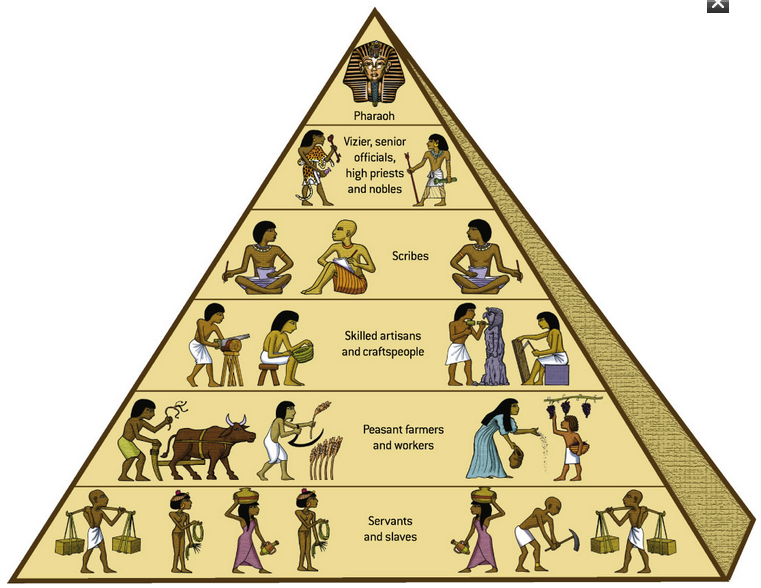https://globalvoicesonline.org/2015/05/14/a-class-debate-in-egypt-after-an-official-resigned-for-saying-garbage-collectors-sons-cannot-become-judges/
An Egyptian Official Resigns After Saying Garbage Collectors’ Sons Cannot Become Judges

The
social pyramid of ancient Egypt, the higher you went the more important
you became and the more your living standards improved. Even in ancient
Egypt, upward mobility was possible
On the May 11, Saber said in a television interview:
The job of a judge requires someone from an environment fit for such a role, with our respect to the janitor and whoever is beneath or above. The environment in which a judge is raised must be suitable. I'm not saying it has to be high but it shouldn't be low. We thank all the janitors who raised their sons to become educated, but giving someone from that background a judge position will make him suffer from a lot, from depression to other problems. It will make him unable to continue.Even in ancient Egypt social mobility wasn't impossible. The sons of peasants would be sent to learn as apprentices with craftsmen and they would move up to a higher class in the society. The fact that class doesn't only still play a role in Egypt but that upward social mobility is impossible shocked many. The former minister seems to say that even if someone works hard and achieves well in his studies, he will not be able to earn what could improve his social status.
For example, being a doctor is considered as a high-paying job in most of the world. However, Egyptian doctor Riham Abdelstar notes how intern doctors earn about 20 US dollars a month:
After all those years of studying and training, I will become an intern doctor after a year and a half and make 150 Egyptian pounds [20$] a month and pay 5 pounds everyday for transportThe minister's comments made more Egyptian speak out about the growing in inequality and class discrimination in Egypt. On Twitter, Kareem Samy tweeted:
The success stories of janitors’ sons and others that we used to hear are disappearing. For your information, our community is being transformed by classicism and the bourgeoisThe reactions to the statements forced the minister to resign. That didn't stop the debate about social classes to become the talk of the Egyptian social media sphere. Cartoonist Islam Jawish made fun of the incident with this sketch:

- It's true, a janitor son isn't fit to be a chancellor – Why? Because of the prestige? -No, Because he's clean.
So now [after the resignation] can a janitor's son become a judge?Another Twitter user noted the illegality of such rhetoric according to the Egyptian constitution:
The justice minister doesn't know that he just committed a crime punishable by the lawThe debate even drew the sarcasm of diplomats. The British ambassador to Egypt John Casson tweeted:
[picture translation: All citizens are equal before the law. They are equal in rights, freedoms and general duties, without discrimination based on religion, belief, sex, origin, race, color, language, disability, social class, political or geographic affiliation or any other reason.
Discrimination and incitement of hatred is a crime punished by law.
The State shall take necessary measures for eliminating all forms of discrimination, and the law shall regulate creating an independent commission for this purpose.]
Do you want to work in the British Embassy? We welcome everyone and we welcome the janitor's sonThe reactions to the ambassador's tweet were diverse, between those who wanted to kick him out of the country and those who cheered him for his sense of humour.
This isn't the first time that this matter was discussed in Egypt. The deputy head of the cassation court Ahmed Ali Abdulrahman said the exact same thing before.
The fact that this incident didn't pass like previous incidents did before might mean that there's a rise in role of social media where people are more capable of getting news and interacting with it. This doesn't make up for the void in parliamentary oversight caused by the delay in elections of course. However, the fact that people from various groups are debating the role of class segregation in the structure of the state is uplifting.
Where I come from such things are barely noticed when they happen and pass without repercussions as this Twitter user Abu Omar Al Shafee from Bahrain notes:
The new appointments for the public prosecutors in Bahrain were distributed among the sons of Members of Parliament, former members of parliament and people in power…What discrimination are you talking about?
No comments:
Post a Comment